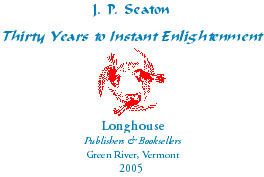

Not every Zen poet was as rough and raw in so many ways as the
mountain men Han Shan and Shih Te or their bohemian urban buddy
Wang Fan-chih. But laughter, be it created by sharp pointed wit or
warm embracing humor, is often a sign of Zen’s influence in Chinese
poetry. The Taoist classics make a major contribution to the
Chineseness of Zen Buddhism, and you need look no further than
the writings of Chuang Tzu to find all the humor any tradition could
ever need (and certainly more than any other world religion has).
But humor is elusive, always. I can explain why each of these poems
makes me laugh: I won’t. I chuckle sometimes when I figure out (or
think I’ve figured out) what these guys are saying, just because it
took me so long to get it. Thirty years to instant enlightenment, one
of Zen’s funniest jokes? ~ J. P. SeatonMedallions and the laughing Bodhisattvas are created by
Jerome Seaton. They embody the deepest mysteries of the original
poems more deeply and more fully than any translations can, (or is that
just monk talk?).
Seng Yu, was a poet, a painter, a calligrapher (in some Chinese circles
considered that was the highest art of all), and a Buddhist monk. He
lived in the first half of the sixth century, before Zen was full fledged.
To everything there is a season.
To everything there is a season.
There can be peace. Reason is also fitting.
Spring flower, Autumn moon:
a thousand tens of generations
leave no trace.Shen Tsan (T’ang Dynasty) was a native of Southeast China. The original
poem, a well known one, features a pun on the similarities of books and
windows (both made of paper, in T’ang China). It took me years to get
over the fact that I couldn’t translate the pun. Go figure.
The Door is Open
Door’s open: why can’t you get your butts out?
Maybe pile up your books, and climb out the window?
A life time you’ve been pondering that paper-pile!
When, (oh, when?), you gonna get your heads out?
Ling Yi (d. 762) was one of the first of the more traditionally cultivated
Zen monks to make “Zen poetry”. Unless I miss the point, I don’t think
there is anything funny about this poem, except maybe that we still usually
miss the point. I think here I laugh, maybe as I do with Seng Yu, in pure
delight.
Drinking Tea At Greenmount Pool.
Wildnerness spring
and smoke and fire
up here, with the white clouds.
Sitting, drinking, the fragrance
of the tea: I love this mountain.
Beneath the cliffs, for now,
stay moored, don’t dare the surge.
Green Creek’s flowing waters:
and the sunset, rushing,
rushing.
Two poems by Huai Chun (Fl. 907-960). Huai Chun was a Buddhist,
famous as a pre-cognator. These two verses were written, according to one
source, in response to a request for help from an officer of the police.
I.
My home’s in the Snake’s Gate Hills.
That’s west of west, over that way…
There, there’s an Oriole that sings.
Well. Now, I’m not over there, where the Oriole sings,
but the Oriole sings, where it does sing, still.
II.
My home’s in the Snake’s Gate Hills,
Over here, year in year out, there’s a flower blooms red.
Well now… when I’m not where the red blossom’s red,
that blossom blooms where it blooms, red, still.
Cheng Fu is, other than his name, anonymous: that’s funny. We know
only that his poem was probably written in the later T’ang, that it was
his only work to survive. It survives both as an individual poem and as
part of a linked verse, a collaborative poem form that invites verbal
playfulness.
Freedom’s Good
Freedom’s good:
all day long my palace a pine.
Not many get it.
It’s a breeze, I guess
I hear, or
is that just monk-talk.
This last poem, was by the monk Ts’an Liao Tzu ( c.1077 ) one of the best
friends of one of China’s great (some say greatest) lay poets, Su Shih (aka
Su Tung-p’o), who was, like a lot of people then and now, also a lay
practitioner of Zen. Like Su Shih, Ts’an Liao was a sharp wit and a
crafty wordsmith. This poem was certainly meant to be witty. It’s not easy
in the original.
Great Big Little Hut
One hut-full of
Universe: so where’s the
“little” come in? That rare guy, inside:
empty, whole without
even one single speck
of dirt.
Bob Arnold ~ Go
Now available ~
J. P. Seaton.Thirty Years to Instant Enlightenment. Longhouse, 2005. First edition. Fold out accordion booklet. New. Limited edition. $10
As an act of goodwill and for poetry - Longhouse is sending out each month complete publications - online - of one poet we have published in booklet form for everyone to share. It's a way of giving back to many of you who have sent to us poems, letters, purchases and the same goodwill over the years. The series will fly in under the banner of our Woodburners We Recommend. It should also be felt as a certain warmth in memory of our close friend and long time working companion Cid Corman. Each monthly booklet will also be available for purchase from Longhouse. For those readers that travel back as far as 1972 when Longhouse began, you know poetry was released like bandits by the day, by the week, by the month, and always free. We have never taken on grants and meant poetry to be seen & heard & on poetry terms. For the years 2004-5 and within the universal cyber cosmos, we would like to share a dozen poets with you....and only ask that you share them further.
Home
© J. P. Seaton 2005
- August 2005s
- Site design by two-hands
- www.LonghousePoetry.com
- [email protected]